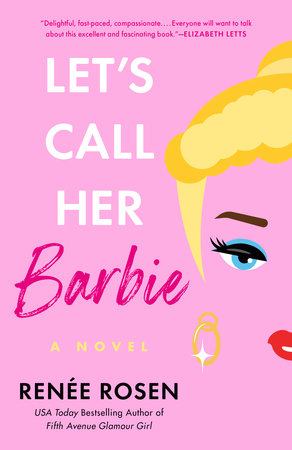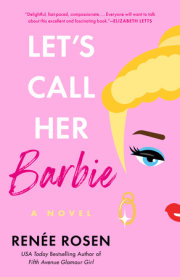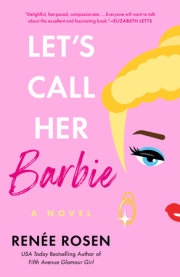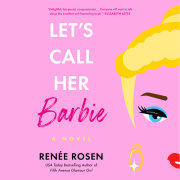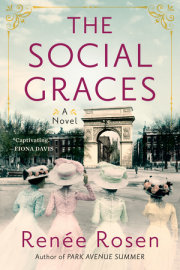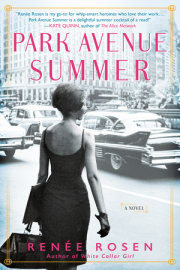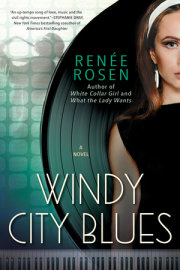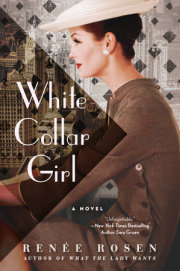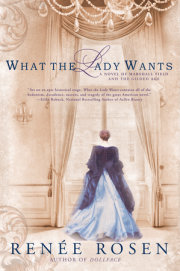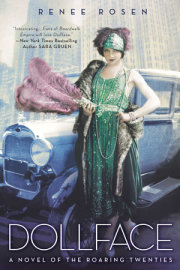My Sources Say No
1956
Pop Goes the Weasel" is what Ruth hears when she opens the conference room door. She's jet-lagged but refuses to succumb on her first day back from vacation. Too excited to have slept on the plane, she's operating on coffee, cigarettes and pure adrenaline. She's carrying the foot-long carton that rode in her lap on the flight from Switzerland to Los Angeles and cannot wait to reveal what's inside. Her gut tells her she's on the cusp of something big, but even Ruth Handler can't imagine the Pandora's box she's holding in her hands.
Elliot, her husband and business partner, is at the far end of the table, plucking the strings on a red Uke-A-Doodle, the first toy he ever invented. He's not jet-lagged, because unlike Ruth, he slept on the plane. Nothing comes between Elliot and his sleep. Seated next to him is an engineer fresh out of Harvard, the ink still wet on his diploma. He's futzing with a jack-in-the-box, the clown's head bobbing on its coiled spring. He shoves the clown back inside, closes the lid and cranks the handle for an encore as another weasel goes pop. To his right is a man who rowed for Princeton in 1947 and is now loading a round of caps into the chamber of a toy pistol. Across from him is a Cornell graduate, class of '51, who's shaking a Magic 8 Ball and praying over it with eyes closed as if his life's happiness depends on the answer. To an outsider, they look like a bunch of men goofing off, but they are highly skilled Ivy League engineers, and making toys is a serious business, especially here at Mattel.
"Good morning, gentlemen," Ruth says, taking her seat at the head of the table. One by one the toys are exchanged for protractors, compasses and pads of paper. Gesturing to the empty chair, she says, "I see your ringleader is missing."
Only Jack Ryan can get away with being late to a meeting. No one else would dare keep her waiting. The rest of them fear her, and with good reason. She's their boss and is well aware that they call her Ruthless behind her back, which she secretly likes. Ruth is petite, only five foot two, and yet she looms larger than Elliot in many respects. Always fashionable, she sports a smart hairstyle, cropped short with a thick row of dark bangs. She's a purposeful woman, the sort who makes men say idiotic things like Smile when they pass her on the street.
Finally, the door swings open and Jack swaggers in like he's six feet tall rather than five feet, eight inches-three of which he's inherited from his imported Italian elevator shoes. He's been with Mattel for about a year now, ever since Elliot lured him away from the aerospace enterprise, Raytheon. Jack's only thirty and is already a vice president overseeing the research and development department.
While Jack settles in, Ruth lights a cigarette, fisting up the empty pack of Winstons she opened the night before on the plane. She'll cut back, she promises herself, but not today.
When everyone's ready, Ruth takes charge of the meeting. Topping her agenda is Mattel entering the doll market. They've wanted in on this lucrative piece of the business for ages but haven't seen a clear path forward. Until now. She's got the answer and it's going to turn the doll world on its proverbial head.
"We all agree that there's a glut of baby dolls on the shelves right now. The last thing anyone needs is another doll that blinks or cries or wets itself." Ruth speaks at a measured pace, to keep from jumping right in. She feels like a racehorse waiting for the starter bell. "What we need is this-" She ceremoniously places the box on the table, lifts the lid and removes the plastic doll inside. "Gentlemen, meet Bild Lilli."
The room falls silent. Not a peep out of them. Instead, they shift in their chairs and clear their throats as they take in the doll-her perky blond ponytail, the pin curl resting on her forehead, her long shapely legs, slender waist and ample pointy breasts. Dressed in hot pants and a tight sweater, Bild Lilli has come-hither eyes that command the room's attention. All twelve inches of her.
"Well"-Ruth drums her fingers-"somebody say something."
For years now Ruth has wanted to create a grown-up doll, but she's not a toy designer and her stick figure drawings never convincingly conveyed her concept. She'd all but given up on the idea until she spotted Bild Lilli in that souvenir shop in Lucerne. Actually, it was her daughter who saw her first. At fifteen Barbara is too old to play with dolls, but she still collects them. Ruth and Barbara were mesmerized by Bild Lilli. There she was. Like she'd been waiting for Ruth to find her.
Ruth bought one for each of them and ran outside to show Elliot. "See? This is what I've been talking about."
"Oh, c'mon, Ruthie," he said, smirking, "we can't possibly make a doll like this."
But he should have known better than to say that. She took it as a challenge, and Ruth has never backed away from a chance to defy expectations. He learned that early on when their budding company needed someone to make deliveries and Ruth volunteered. "No way," said Elliot. "You can't drive a truck." So what did she do? She rented a Dodge pickup, her high heels barely reaching the clutch. Did she care about the men standing by, laughing, placing bets that she couldn't back it out of the lot? So what if it took her almost a dozen tries. She'd be damned if she'd ever let anyone dictate what she can or can't do.
"Give me one good reason why this doll won't work," she said to Elliot. They were still outside the souvenir shop, standing on the sidewalk.
"I'll give you two reasons." He pointed to Bild Lilli's breasts.
"Ah, Ruth," Jack says now, "I don't know if you noticed this little detail or not, but ah, that doll"-he cocks his head to the side-"ah, she's got tits."
This sets off a round of hoots and howls, all of them following Jack's lead: grabbing at each other's chests, making lewd comments. She can't afford to let this meeting get away from her. But they're not letting up. They're not even hearing her. Exasperated, she reaches for the cap gun on the table, aims for the ceiling and fires off three shots. Everyone jumps with a start as the air fills with the scent of sulfur.
"You all sound like a bunch of goddamn boys in a circle jerk." She's learned to talk to them this way, to show them she speaks their language and is just as tough as any man. "Of course she has tits. That's the whole goddamn point. She's not a baby doll kind of doll."
"Then what exactly is she?" asks Jack. "She looks like a hooker."
"She's not a hooker," Ruth insists, though he's not wrong. Jack Ryan knows a prostitute when he sees one. Bild Lilli is based on a risqué German comic strip character who turns tricks while amusing her male admirers. "She's a gag gift," says Ruth. "They sell her mostly to men. You know, like a sex toy."
"So now you want us to make sex toys?"
"Of course not. Jesus." She slaps the table, heat welling up inside her. She's getting flustered, and if she's not careful, they'll mistake her passion for being overly emotional. She needs to be practical, logical. Drawing a deep breath, she backs up and starts over. "We say we want to be in the doll market, and I'm telling you, this is the way to do it. Think about it-we give little boys toy guns, toy soldiers and building blocks. And what do we give little girls? Baby dolls. Little boys can pretend they're grown men, brave soldiers. And you know what little girls get to play? They get to play mommy. They get to play house. That's it."
"And what's wrong with that?" asks Jack.
She looks at him, and at this roomful of men, and drops her cigarette in an ashtray, grinding it out with more force than needed. "You all might find this hard to believe, but not every little girl wants to grow up to be just a housewife and mother. There's more to being a woman than that. If you hand a little girl a baby doll, she's going to make believe she's a mommy. But if you hand her something like this"-she holds up Bild Lilli-"she can pretend she's a young independent woman. Maybe she'll make believe she's going to her office, or out on a date, but she sure as hell's not gonna pretend she's changing a diaper or pushing a stroller."
She ignores the way Elliot's eyebrows hike a bit higher each time she speaks. Clearly, she's going to have to crystalize this for them. "Just think how much the world's changed since the war ended. Anyone want to guess what happened when those soldiers returned home to the ever-loving arms of their sweethearts? I'll tell you what happened-they got busy making babies. Do you realize how many babies were born in 1946?" She poses the question and provides the answer. "Over three million. And that number has grown every year since. Our population has been exploding over the past decade. Right now, in this country, there are millions of little girls between the ages of three and ten. And next year there'll be even more. Many of those girls are simply too old for baby dolls, and there's no toys for them. We can fill a huge hole in the marketplace by introducing a doll they can relate to." She scans the room, eyeing them hard.
Elliot offers an admiring smile, because even though he's not sold on the idea of this type of doll, he appreciates her rationale and can't deny that she's identified something they can capitalize on.
"Gentlemen," she says, "we are sitting on a goddamn gold mine, and yes, that gold mine just so happens to have tits."
Jack sits up a little straighter. "You're serious? You want us to create a doll like this for little girls?"
"That's right." Pulling a fresh pack of Winstons from her pocket, she unravels the cellophane so quickly, it's like she can't get her next cigarette lit fast enough. "This is a million-dollar idea if ever there was one." She hears herself sounding so self-assured, but even as she speaks, she's aware of all the ways a doll like this could go awry. She knows the kind of time, the man-hours, not to mention the money it will take to bring this doll to fruition. If she's wrong, if it fails, what will that mean for the future of Mattel? What will it mean for her? Will the rest of the industry laugh at her, thinking, It figures a woman would come up with something like this?
Sure, everyone here knows there'd be no Mattel without her, but to the outside world, she's just Elliot's wife. Maybe they think she keeps the books or answers the phones. They don't see the behind-the-scenes work she does, the business maneuverings, the negotiations she pulls off. Hell, she doesn't even have her name on the door. Mattel is a combination of their former business partner Harold "Matt" Mattson's name and Elliot's-Matt and El. This doll would at least give her something tangible to show for herself, to say, See, I did this. And there's a part of her that needs that kind of recognition, and despite her doubts, she's ready to take a chance on this doll.
"We'd be fools to walk away from this," she says, ramping up her argument. "This is our chance to create a new segment in the marketplace-it's untapped. No one even knows it exists yet."
Jack picks up the Magic 8 Ball. He shakes it, glances down and sighs. "My sources say no." There's a ripple of laughter. "Sorry, Ruth, interesting idea-it's intriguing-but a doll like that would cost a fortune to produce." He shrugs, case closed. "Let's move on."
After the meeting, Ruth goes into Jack’s office, located next to hers. She stands in his doorway with Bild Lilli in one hand and a freshly lit cigarette in the other. Jack’s office is tidy. There’s a credenza in the corner, fully stocked with top-shelf liquor, and a bearskin rug in the center of the room. He sometimes sprawls out on it to stretch his back or to take a nap, which he believes is a critical part of the creative process-though he’d ream his engineers if he ever caught them sleeping on the job.
Ruth clears her throat, and he looks up from his drafting table. "Why were you so quick to reject this doll?"
"Why? Because." He doesn't say anything more, as if it's understood.
"Don't you see what this doll represents? She radiates a different kind of energy."
"Yeah, she radiates sex." He holds a metal ruler in the air, waving it like a sword.
Ruth takes a pause. She has to be smart about this. If this doll is going to get off the ground, she's going to need Jack on her side. The others, even Elliot, will listen to him. A year ago, when Jack joined Mattel, he was a fresh burst of energy, like a little bouncy ball. There's a childlike playfulness to him that they needed. Together Jack and Elliot went on a toy-making spree, turning out a whole new crop of music boxes, plastic guns and other marvels that spun and whirled and flew off the store shelves.
"Let me ask you something," he says. "When you were a little girl, would you have played with a doll like this?"
The answer is right there. She doesn't even have to reach for it. "No," she says. "But only because I never played with dolls." It was true. Dolls were too frivolous for her, as were most toys. If she'd been apt to play with anything, it would have been her brother's Lincoln Logs. At least she could build with them and have something to show for her efforts. The irony that she's ended up in the toy business is not lost on her. "But we're not talking about me here," she says. "We're talking about an entire segment of the population that doesn't have a toy they can relate to."
"And you think they're going to relate to a doll like this?"
"Do you know how many times I caught my daughter putting on my lipstick, playing in my high heels? Little girls can't wait till they're old enough to wear makeup and fancy clothes. That's the genius of a doll like this."
Copyright © 2025 by Renée Rosen. All rights reserved. No part of this excerpt may be reproduced or reprinted without permission in writing from the publisher.

